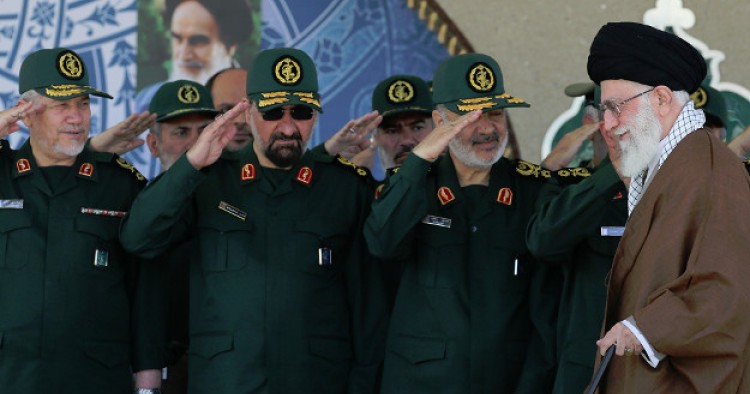The chief commander of the Islamic Revolution Guards Corps (I.R.G.C.) Ground Force has said that he will continue to deploy “military advisers” to defend the government of Bashar al-Assad and the “resistance front” against Israel. “A war has multiple dimensions. The most important one is the ground part. Thus, we decided to assist the Quds Force and deployed advisors to Syria,” the I.R.G.C.-affiliated Tasnim News Agency quoted Brigadier General Mohammad Pakpour as saying. “We will continue our advisory assistance as long as needed,” he emphasized, adding that Iranian advisors in Syria are I.R.G.C. officers with years of experience in battling insurgent groups in Iran’s southeastern and northwestern regions.
The Quds Force, led by Major General Qassem Soleimani, is the I.R.G.C.'s elite unit responsible for external operations.
Pakpour alleged that the United States and its regional allies intend to “destroy Syria as a front-line country of the resistance” – claiming that the Syrian crisis would not have escalated rather quickly had Washington and regional countries not propped up anti-Damascus militant groups. “We will send advisors in all different fields so that the resistance front is not defeated, and we will provide any assistance we can,” he stressed.
Pakpour also confirmed that I.R.G.C. Special Forces also play a key role in the Syrian conflict. He said there was no need to deploy I.R.G.C. military brigades because the Syrian Army and Shiite militia forces are able to defend the Assad regime.
Comment: Since the start of the Syrian civil war six years ago, the I.R.G.C. has actively propped up the embattled Assad regime by not only deploying its personnel but also mobilizing, funding and leading an extensive network of regional Shiite militia groups to fight against opposition groups. The survival of Damascus was highly unlikely without the Iranian intervention. Lieutenant General Ali Abdullah Ayyoub, the chief of the general staff of the Syrian Army, acknowledged the significance of Iran’s support in a meeting with Iran’s Defense Minister Brigadier General Hossein Dehghan in Tehran earlier this week.
As Pakpour’s remarks indicate, Tehran believes the fall of Damascus would mean not only losing a strategic ally, but also regional gains the Islamic Republic has scored over the past decades by attempting to expand its ideological, political and military spheres of influence in the region. Most importantly, Syria is a vital conduit for the Iranian government to continue to arm Lebanese, Palestinian and Iraq militant groups against Israel.
Pakpour’s comments also show that Iran has no intention to scale down its involvement in Syria despite the Trump administration’s pledge to push back against Iran’s subversive activities in the region. After Washington launched cruise missiles against a Syrian Army air base last month, I.R.G.C. leaders made it clear that the strikes would not alter Iran’s policies and actions in Syria or in the broader region.
Furthermore, while I.R.G.C. leaders claim their personnel only provides advisory assistance in Syria, the large number of Iranian casualties in Syria suggests that I.R.G.C. forces are playing an active role on the Syrian front lines. In March, a senior Iranian official said that more than 2,000 combatants dispatched by Iran to fight in Syria and Iraq have been killed in recent years. “At present, we have 2,100 defender of shrine martyrs and the path for martyrdom is still open,” said Mohammad Ali Shahidi Mahlati, the head of Iran’s Foundation of Martyrs’ and Veterans’ Affairs.
The Middle East Institute (MEI) is an independent, non-partisan, non-for-profit, educational organization. It does not engage in advocacy and its scholars’ opinions are their own. MEI welcomes financial donations, but retains sole editorial control over its work and its publications reflect only the authors’ views. For a listing of MEI donors, please click here.













